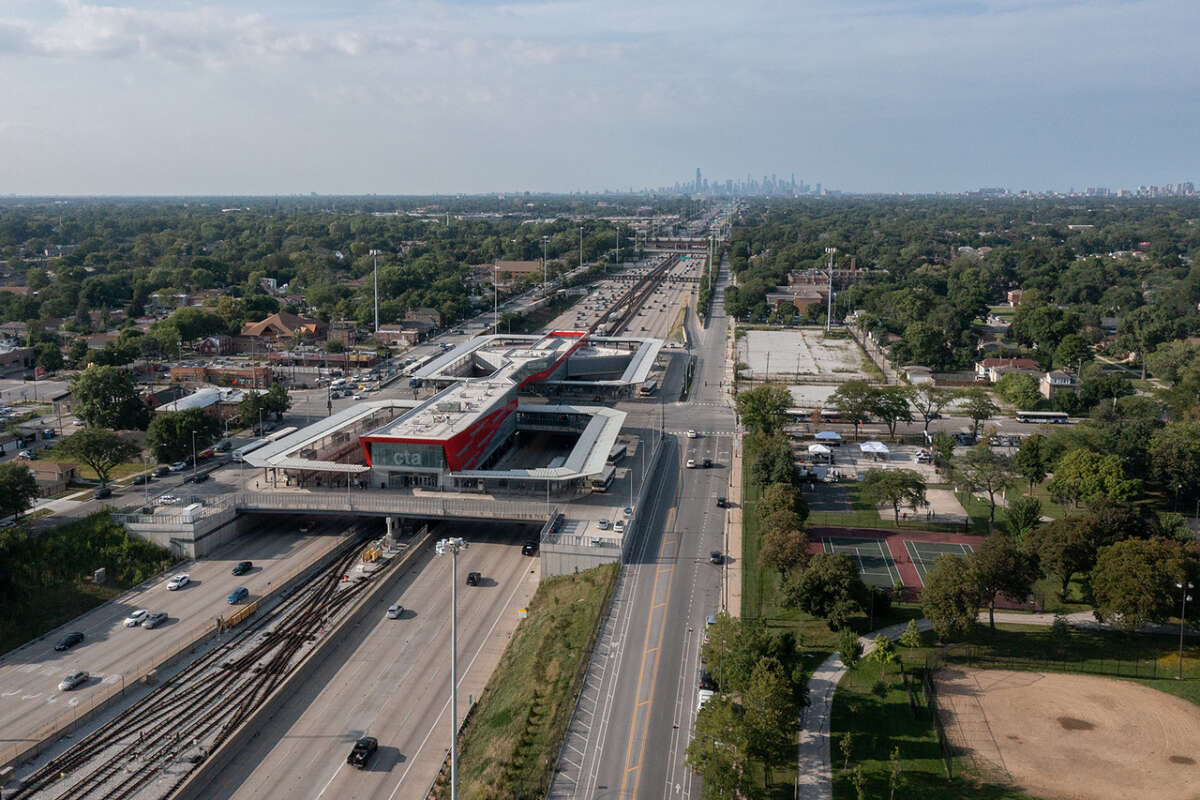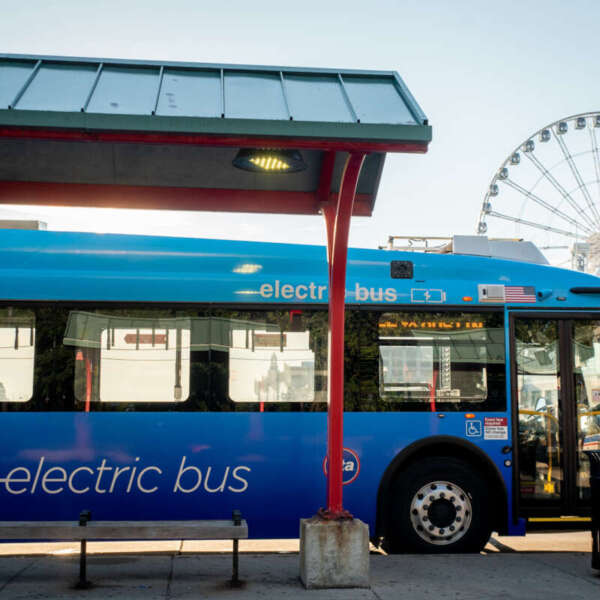How Chicago transit agencies are using historic capital funding for critical projects
October 19, 2023
October 19, 2023

At the end of each year, the RTA reviews, adopts, and monitors the annual operating budgets and five-year capital programs of all three service boards (CTA, Metra, and Pace). The 2023 Regional Operating Budget and Five-Year Capital Program includes more than $3.5 billion in annual operating expenses and more than $5.7 billion over five years for capital projects.
Historic levels of capital funding for transit projects have been made available in recent years, thanks in part to the state’s Rebuild Illinois program and the federal Bipartisan Infrastructure Investment and Jobs Act (IIJA). As new funds are secured, the RTA will continue to communicate the region’s capital priorities and do in-depth evaluation of the projects that are being funded. To that end, the 2024-2028 Capital Program will include 15 new evaluation metrics that include important regional goals such as improving equity, addressing climate impact, and expanding accessibility.
With this new funding, the current five-year capital program provides a little over $1 billion per year, which, while a historically high amount, is still inadequate to meet the regions state of good repair needs or allow for significant improvements or expansions beyond maintenance. To bring the system into a state of good repair, the region needs an investment of $2 to $3 billion per year. At current levels of investment, only nine of the 76 priority projects identified by the RTA in its current capital program are fully funded. Increasing investment in transit infrastructure is key to increasing system speed and reliability, factors that make transit a competitive travel option and drive ridership growth.
In addition to capital funding challenges, the system will face a $730 million annual operating budget gap beginning in 2026. At nearly 20% of the annual expense budget, this gap, if unaddressed, would drastically impact current service and prohibit any additional improvements to the regional system. Combined, these funding challenges could spell disaster for the region’s transit network if left unaddressed.
The region’s transit system relies on federal and state capital funding to keep up with routine and long-term maintenance, and to fund improvements and expansions in high-need areas. These resources come from a variety of federal, state, and local sources – such as Federal Transit Administration (FTA) formula and discretionary funds; state bonds; local bond issuances by the RTA and Service Boards; and gas tax revenue (PAYGO). State PAYGO funds are critical to investing in the transit system’s long-term health. PAYGO provides annual funding for capital projects and has fewer limitations on how the funds can be spent, and are a key source for match requirements to secure discretionary federal transit funding.
One such match allowed the region to secure a nearly $2 billion investment from the FTA’s New Starts program for the long-awaited Red Line Extension project. The project aims to extend the CTA Red Line by 5.6 miles to 130th Street on Chicago’s Far South Side, connecting residents in historically disinvested communities to opportunity throughout the region. CTA estimates that the project will create 25,000 jobs and spur $1.7 billion in real estate development near the new stops. Construction is expected to begin in 2025. Over $350 million in PAYGO funds are proposed in the 2024-2028 Capital Program as a match to the federal funds.
The Rebuild Illinois program also catalyzed investment in our transit system. Using Rebuild funds, Metra and Pace were able to collaborate with the City of Harvey to modernize and relocate the Harvey Transportation Center, better integrating service and serving riders in that area. The Transportation Center will be moved to the Metra Electric Line Harvey Station, ensuring safer and easier transfers. The project aims to transform the Harvey Station into a unified, modern multimodal transportation hub and will enhance the rider experience by improving accessibility and reliability.
Rebuild Illinois also helped Metra to break ground on a project to rehabilitate 13 stations along its Metra Electric Line across Chicago’s South Side and South Suburbs. As part of its Metra Electric Community Initiative, Metra has started construction at the 79th, 87th, 103rd, and 147th Street stations. The stations will be made ADA-accessible, receive modern amenities for riders, and improve access to transit for riders in historically disinvested communities. Among the stations to be rehabilitated is the 95th Street/Chicago State University station. Design work is underway, and Metra has partnered with the University to fund the project.
After the passage of the IIJA, approximately $250 million in additional capital funds were made available for the region each year. This funding is being used to improve some of the oldest infrastructure on the system, like on the CTA’s Blue Line. While routine maintenance and modest improvements have been made, new capital funding will assist the CTA in bringing the Forest Park Branch into the 21st Century. The Forest Park Branch Rebuild aims to rehabilitate seven stations and replace and upgrade track infrastructure to make the Forest Park Branch faster, safer, more reliable, and accessible. Trackwork from Lasalle St. Station to Illinois Medical District was completed in early October 2023, and the remainder of Phase I includes a rehab of the Racine Station that will make improvements to accessibility and the power supply – allowing for more frequent service across the line. The full Phase I project is expected to be completed by 2025, however additional capital funding is needed to complete the rebuild.
Due to long-term underinvestment, a vast majority of capital funds available to our region are directed toward “state of good repair” projects. With additional investment, the system can achieve a state of good repair and take on larger projects to expand to more riders. Increased, reliable sources of capital funding are essential to providing the service that riders expect and deserve, and the RTA’s strategic plan – Transit is the Answer – outlines a path to secure that funding. To do so, leadership from a diverse group of partners is needed. Join our coalition to help advance this agenda and improve transit for the future.
Subscribe to our Newsletter
Related Articles
 2025 Regional transit budget available for public comment, foreshadows risk to system’s future without fiscal cliff solution
2025 Regional transit budget available for public comment, foreshadows risk to system’s future without fiscal cliff solution
The RTA has released the 2025 Regional Transit Operating Budget and Five-Year Capital Program for download and public comment. The budget comes as an operati...
November 15, 2024 With equity at the forefront, CTA, Metra, and Pace open new facilities, prioritize upgrades in south and west communities
With equity at the forefront, CTA, Metra, and Pace open new facilities, prioritize upgrades in south and west communities
This year, CTA and Pace have opened or advanced various new facilities in south and west communities throughout the region, and Metra has prioritized upgrade...
October 9, 2024 New project management oversight report highlights more than 100 projects representing $8.2 billion in capital investments
New project management oversight report highlights more than 100 projects representing $8.2 billion in capital investments
The RTA’s Project Management Oversight (PMO) program ensures that the Service Boards—CTA, Metra, and Pace—are spending capital funds and managing their infra...
June 27, 2024 Transportation Tuesday recap: Improving and expanding the transit system strategically
Transportation Tuesday recap: Improving and expanding the transit system strategically
With last year’s adoption of Transit is the Answer came 15 new evaluation metrics that comprise a strategy for evaluating and selecting capital projects. Now...
May 30, 2024 Transit is the answer to meeting Illinois’ climate goals
Transit is the answer to meeting Illinois’ climate goals
As we celebrate Earth Day 2024, the RTA is announcing Transforming Transit —the agency’s commitment to lead the Chicago region’s transit system into the futu...
April 18, 2024 Three years into the Infrastructure Investment and Jobs Act, Chicago’s transit system is winning competitive grants and advancing critical projects
Three years into the Infrastructure Investment and Jobs Act, Chicago’s transit system is winning competitive grants and advancing critical projects
The Infrastructure Investment and Jobs Act (IIJA), passed in 2021, represented a historic level of federal investment for shoring up the nation’s infrastruct...
March 12, 2024